|
|
|
Sort Order |
|
|
|
Items / Page
|
|
|
|
|
|
|
| Srl | Item |
| 1 |
ID:
165050
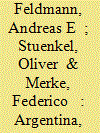

|
|
|
|
|
| Summary/Abstract |
This article examines the role of Argentina, Brazil and Chile (the ‘ABC countries’) in supporting democracy through the logic of consequences and appropriateness in three emblematic cases: the removal of President Zelaya in Honduras in 2009, the constitutional crisis that led to the removal of President Fernando Lugo in Paraguay 2012 and the sudden closing of the National Assembly in Venezuela in 2017. The authors argue that the ABC governments’ responses to governance crises have been shaped by a mixture of motivations, both instrumental (geopolitical interest or ideological affinity) and ideational (a normative preference for democracy). This mixture has resulted in inconsistent policies deriving from the mismatch between the normative commitments made by these countries, enshrined in multilateral instruments such as democracy clauses, which have often limited their room for manoeuvre, and their preference for a measured, prudent foreign policy based upon traditional principles of non-intervention. Specifically, the authors find that the ABC countries’ stance on democracy support depends on two fundamental conditions: their leverage vis-à-vis the target state and the degree of certainty regarding a potential resolution of a given democratic crisis.
|
|
|
|
|
|
|
|
|
|
|
|
|
|
|
|
| 2 |
ID:
148210
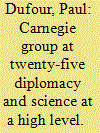

|
|
|
|
|
| Summary/Abstract |
There is a seeming renaissance underway on how science can be used to inform statecraft more effectively. From Science & Diplomacy to the science diplomacy training events sponsored by the American Association for the Advancement of Science (publisher of Science & Diplomacy) and The World Academy of Sciences to the annual Japanese Science & Technology in Society forum, from the United Nations Educational, Scientific and Cultural Organization (UNESCO) World Science Forum to the Organisation for Economic Co-operation and Development’s Science and Technology Ministerial conferences, considerable attention is being paid to the intersection of knowledge with international relations.
|
|
|
|
|
|
|
|
|
|
|
|
|
|
|
|
| 3 |
ID:
127325
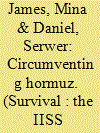

|
|
|
|
|
| Publication |
2014.
|
| Summary/Abstract |
After 34 years, the Carter Doctrine remains valid. But there are cheaper and more effective ways of keeping the oil flowing than unilateral deployment of military force.
|
|
|
|
|
|
|
|
|
|
|
|
|
|
|
|
| 4 |
ID:
153716
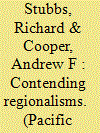

|
|
|
|
|
| Summary/Abstract |
As regions become more institutionalized, they are characterized by two competing trends. First, key regional institutions can become hub institutions that act as transmitters of a comprehensive set of norms. Second, as regional institutions increase in number, regions themselves are liable to become more fragmented. How these trends have played out is explored in two key regions, the Americas and the Asia-Pacific. It is concluded that regions are not static entities but are ever-changing structural arrangements. Hub institutions can be challenged and the consequences can be significant as regions gain in importance on the international stage.
|
|
|
|
|
|
|
|
|
|
|
|
|
|
|
|
| 5 |
ID:
196203


|
|
|
|
|
| Summary/Abstract |
Among the potentially most consequential effects of populism is its impact on countries' international conflict behaviour. However, empirical evidence about populists' approach to international disputes is inconclusive. We develop a theoretical framework focused on mobilization and personalization, which we argue are particularly relevant characteristics of populist foreign policy-making. We hypothesize that, on a conflict–cooperation continuum, a country's approach to a bilateral dispute will become more conflictive under a populist government if that dispute is strongly used for domestic political mobilization, and if decision-making on that issue is highly personalized. Conversely, foreign policy will not become more conflictive in cases of weak mobilization and personalization. We carry out in-depth qualitative within-case comparisons of non-populist and populist governments' policies in Bolivia (2002–2019), India (2004–2022), and the Philippines (2010–2022), focusing on two selected bilateral disputes per country. Drawing on a broad range of sources, including 71 expert interviews conducted in the three countries, we find that populists in power escalate international disputes if they strongly use foreign policy issues for domestic mobilization and, at the same time, strongly personalize decision-making. This finding nuances existing assessments about the effect of populism on foreign policy change.
|
|
|
|
|
|
|
|
|
|
|
|
|
|
|
|
| 6 |
ID:
167114
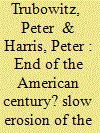

|
|
|
|
|
| Summary/Abstract |
Can the United States continue to shape international politics as it has done for the past 70 years, or is the era of US preponderance coming to an end? Most attempts to answer this question focus on the concept of relative power—that is, the balance of material capabilities between the US and its geopolitical competitors. From this perspective, the ‘American era’ will be over when rival powers are able to muster the military capability to counteract US ambitions on the world stage. In this article, we argue that the most pressing checks on US leadership come not from foreign competitors, but rather from domestic politics. While America's relative power as measured by its military arsenal vis-à-vis those of its rivals has held steady, its ‘usable power’ has declined. We attribute this decline in usable power to three domestic-level factors: the emergence of hyper-partisanship, the absence of a compelling strategic narrative, and the erosion of a social contract of inclusive growth. Our analysis suggests that US leaders will find it difficult to implement a programmatic grand strategy of any description—liberal internationalism, offshore balancing, retrenchment or even President Trump's ‘America First’ strategy—so long as domestic-level dysfunction goes unattended and until usable power is restored.
|
|
|
|
|
|
|
|
|
|
|
|
|
|
|
|
| 7 |
ID:
108342
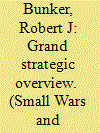

|
|
|
|
|
| Publication |
2011.
|
| Summary/Abstract |
This grand strategic overview highlights and analyzes the influence of epochal change on the state and conflict and the new realities with which the United States must now contend. This deep context is being provided so that (1) the belligerent and politicized non-state entities that have emerged in Mexico and the Americas can be better understood within the larger three-front grand strategic temporal conflict the US is now engaged in; and (2) the stark realities that the US faces - such as loss of unilateral world dominance, increasing debt and ongoing deficits, shifting demographics, inability to staunch the flow of and demand for illicit drugs, and an increasing prison population - are highlighted. Finally, this essay finishes with a discussion of the many important contributions contained in this edited work.
|
|
|
|
|
|
|
|
|
|
|
|
|
|
|
|
| 8 |
ID:
187654
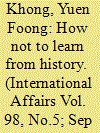

|
|
|
|
|
| Summary/Abstract |
This article attempts to answer two questions. First, what are the relevant ‘how not tos’ when it comes to learning from history? I argue that from existing accounts of how policy-makers (mis)learn the lessons of history, we can derive four ‘how not tos’: 1) do not settle or fixate on the first, or most ‘available’ or ‘representative’ analogy; 2) do not dismiss differences between your favoured analogy and the case in question; 3) do not neglect alternative analogies; and 4) do not shirk from ‘testing’ the observable implications of your preferred analogy. Second, do policy-makers show awareness of these ‘how not tos’ as they use historical analogies? An examination of how they are using the Cold War analogy to interpret the nature and trajectory of contemporary US–China relations suggest that they seem to have avoided the worst pitfalls of analogical reasoning in foreign affairs. The most prominent users of these historical analogies show awareness of the first three of the above proscriptions; all, however, shy away from the fourth proscription—testing the prognostications of their favoured analogy. Although this is far from perfect, the signs point to the Cold War analogy being used in ways that avoid the general pattern of superficial and poor use documented in existing analyses of analogical reasoning in foreign affairs.
|
|
|
|
|
|
|
|
|
|
|
|
|
|
|
|
| 9 |
ID:
127331
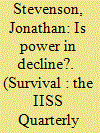

|
|
|
|
|
| Publication |
2014.
|
| Summary/Abstract |
The title of Moisés Naím's new book, The End of Power, is unabashed hyperbole. By the evidence he adduces, the ongoing dispersal of power will entail undramatic and evolutionary adjustments.
|
|
|
|
|
|
|
|
|
|
|
|
|
|
|
|
| 10 |
ID:
196202


|
|
|
|
|
| Summary/Abstract |
This article analyses how populism is conceptualized and studied in International Relations (IR) and argues that it should be seen as a political logic instead of a political ideology. It does so by demonstrating that ‘populist foreign policy’ looks radically different in analyses of the populist left, refuting the possibility of any distinctly ‘populist’ foreign policy positions. We argue that large parts of IR scholarship practise a form of concept-stretching that undermines the quality of analysis as well as the ability to make meaningful policy recommendations. Using the empirical case-studies of the politician Bernie Sanders in the United States and the political party Podemos in Spain, the article demonstrates that populism does not translate into any shared ideological positions, but is a way of formulating and performing—in these cases—leftist politics through which political actors can interpellate and mobilize different societal groups and demands behind their political projects. In particular, the analysis debunks common assumptions about populism's alleged effects on foreign policy and dangers to pluralist democracy, and shows that populism neither necessarily opposes multilateralism, migration and global public good provision nor formulates an authoritarian claim to power.
|
|
|
|
|
|
|
|
|
|
|
|
|
|
|
|
| 11 |
ID:
196192


|
|
|
|
|
| Summary/Abstract |
A politicization of diplomacy weakens the professionalism of the foreign service and arguably endangers the external relations of states. Yet, this phenomenon has largely escaped scholarly scrutiny. Public administration research on politicization usually overlooks the foreign service, whereas diplomacy scholars have focused almost exclusively on the United States. Our exploratory study of ambassador appointments compares the levels and modes of politicization (through politically connected professionals, or political appointees) of 669 ambassadors in 2019, across seven countries and three administrative traditions. The analysis is guided by three expectations: 1) countries that are more politicized overall appoint more non-career ambassadors; 2) patronage recruitment of political appointees focuses on low-hardship postings; and 3) politically connected professionals are used to control politically important foreign missions. We find that states politicize their foreign services to a varied degree and in different ways. Appointing politically connected professionals instead of political appointees is the most common way of politicization among our cases. In this regard, the US is an outlier, which also points to the need of studying politicization of diplomacy comparatively. This article thus makes an important contribution by setting the agenda for future research on this hitherto underexplored topic.
|
|
|
|
|
|
|
|
|
|
|
|
|
|
|
|
| 12 |
ID:
140897
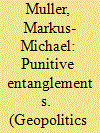

|
|
|
|
|
| Summary/Abstract |
This paper analyses the export-import business of penal policies that accompanies the “war on transnational street gangs” between the United States and Central America. It argues that far from being a unidirectional export of punitive politics from the United States towards Central America, many of these punitive exports travel “back home”. This creates transnational punitive entanglements that contribute to the contingent convergence of punitive geopolitics and domestic politics in the guise of a transnational penal apparatus that integrates law enforcement agencies and military forces, securocratic epistemic communities and national political entrepreneurs into a functionally cohesive but decentred transnational security structure engaged in a multilayered punitive containment of transnational street gangs across the Americas.
|
|
|
|
|
|
|
|
|
|
|
|
|
|
|
|
| 13 |
ID:
108343
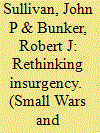

|
|
|
|
|
| Publication |
2011.
|
| Summary/Abstract |
Driven by globalization, Internet communications technology (ICT), and new economic forms the nature of states may be changing. Transnational criminal organizations (TCOs) - including what are commonly known as cartels - are early adopters to the new political/economic landscape. In addition to seeking to rule the illicit economy, criminal actors (networked cartels and gangs) are challenging states through high-order violence and leveraging nascent social/spiritual movements (narcocultura) to potentially usher in a new political dynamic. These violent non-state actors (criminal soldiers) are insurgent actors. They are waging new forms of insurgency - criminal and possibly spiritual - that have the potential to reconfigure states.
|
|
|
|
|
|
|
|
|
|
|
|
|
|
|
|
| 14 |
ID:
165031
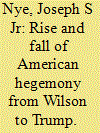

|
|
|
|
|
| Summary/Abstract |
A century ago, Woodrow Wilson changed America's place in the world when he sent two million men to fight in Europe, but America withdrew into isolationism in the 1930s. After the Second World War, Harry Truman and others created a framework of permanent alliances and multilateral institutions that became known as the ‘liberal international order’ or ‘Pax Americana’. Those terms have become obsolete as descriptions of the US place in the world, but the need for the largest countries to provide public goods remains. An open international order covers political–military affairs; economic relations; ecological relations; and human rights. It remains to be seen to what degree these depend on each other and what will remain as the 1945 package is unpacked. Wilson's legacy of developing international institutions continues to make sense. Leadership is not the same as domination, and it will need to be shared. There have always been degrees of leadership and degrees of influence during the seven decades of American pre-eminence after 1945. Now with less preponderance and a more complex world, American exceptionalism in terms of its economic and military power should focus on sharing the provision of global public goods, particularly those that require ‘power with’ others. Wilson's century old insights about international institutions and a rules-based order will remain crucial, but America's place in that world may be threatened more by the rise of populist politics at home than the rise of other powers abroad.
|
|
|
|
|
|
|
|
|
|
|
|
|
|
|
|
| 15 |
ID:
127313
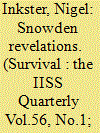

|
|
|
|
|
| Publication |
2014.
|
| Summary/Abstract |
The stream of revelations about US communications-intercept operations deriving from material purloined from the National Security Agency (NSA) by rogue contractor Edward Snowden has aroused strong emotions in a variety of constituencies. Civil-liberties groups concerned with issues of personal freedom and data privacy have expressed alarm about the pervasive nature of the NSA's bulk data collection. States that have been shown to have collaborated with the organisation in such collection have been embarrassed. And countries that considered themselves to have friendly relations with the United States but were the subject of its covert intelligence collection have reacted with varying degrees of outrage. Some of this outrage has been real, but much of it is manufactured for either domestic political reasons or in the hope of leveraging some policy advantage from the discomfiture of the US and its allies. The major US technology companies and service providers which have to varying degrees collaborated with the NSA, either voluntarily or in response to judicial warrants, have experienced a decline in customer trust, with uncertain but potentially significant implications for their future business prospects.
|
|
|
|
|
|
|
|
|
|
|
|
|
|
|
|
| 16 |
ID:
140919
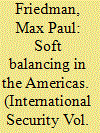

|
|
|
|
|
| Summary/Abstract |
In the aftermath of the 2003 U.S.-led invasion of Iraq, scholars of international relations debated how to best characterize the rising tide of global opposition. The concept of “soft balancing” emerged as an influential, though contested, explanation of a new phenomenon in a unipolar world: states seeking to constrain the ability of the United States to deploy military force by using multinational organizations, international law, and coalition building. Soft balancing can also be observed in regional unipolar systems. Multinational archival research reveals how Argentina, Mexico, and other Latin American countries responded to expanding U.S. power and military assertiveness in the early twentieth century through coordinated diplomatic maneuvering that provides a strong example of soft balancing. Examination of this earlier case makes an empirical contribution to the emerging soft-balancing literature and suggests that soft balancing need not lead to hard balancing or open conflict.
|
|
|
|
|
|
|
|
|
|
|
|
|
|
|
|
| 17 |
ID:
121380
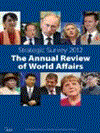

|
|
|
|
|
| Publication |
London, IISS, 2012.
|
| Description |
416p.Pbk
|
| Standard Number |
9781857436532
|
|
|
|
|
|
|
|
|
|
|
|
Copies: C:1/I:0,R:1,Q:0
Circulation
| Accession# | Call# | Current Location | Status | Policy | Location |
| 057358 | 355.40723/IIS 057358 | Main | On Shelf | Reference books | |
|
|
|
|
| 18 |
ID:
169620
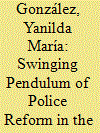

|
|
|
|
|
| Summary/Abstract |
“The role of exercising the state’s coercive authority makes the police both an instrument of power and a formidable political actor whose cooperation is needed by politicians.”
|
|
|
|
|
|
|
|
|
|
|
|
|
|
|
|
| 19 |
ID:
119626
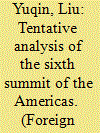

|
|
|
| 20 |
ID:
125910
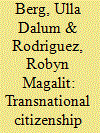

|
|
|
|
|
| Publication |
2013.
|
| Summary/Abstract |
A variety of phenomena including mass migrations, diasporas, dual citizenship arrangements, neoliberal economic reforms and global social justice movements have since the 1970s produced shifting boundaries and meanings of citizenship within and beyond the Americas. This special issue builds upon, but also extends, prior discussions on transnational citizenship, by situating new practices of 'immigrant' and 'emigrant' citizenship and the policies that both facilitate and delimit them in a broader political-economic context and accounts for how new forms of neoliberal governance shape such practices. The essays included here draw from a range of disciplines and inter-disciplinary perspectives that focus on migration between the United States and countries in Latin America and the Caribbean which in recent years have been transformed into 'emigrant states.'
|
|
|
|
|
|
|
|
|
|
|
|
|
|
|
|
|
|
|
|
|